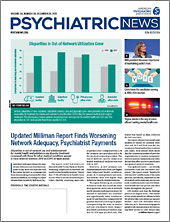Individuals seeking treatment for mental and substance use disorders continue to pay more out of pocket and face more barriers to accessing care than those seeking treatment for other medical conditions, according to a report released last month by Milliman Inc.
The report, titled “Addiction and Mental Health Versus Physical Health: Widening Disparities in Network Use and Provider Reimbursement,” found that 17.2% of behavioral health visits in 2017 were to an out-of-network provider—thereby incurring more out-of-pocket costs—compared with 3.2% for primary care providers and 4.3% for medical/surgical providers. The out-of-network rate for behavioral health residential facilities was over 50% in 2017.
Moreover, in 2017 primary care reimbursements were about 24% higher than behavioral health reimbursements. In 11 states primary care reimbursements were 50% higher than behavioral health reimbursements.
The report follows up on an earlier Milliman study that found the same discrepancies: more out-of-network use by patients seeking treatment for mental or substance use disorders and significantly lower reimbursement for psychiatrists compared with general medical and surgical physicians providing the same or similar services (
Psychiatric News). The report was based on data collected for 2013 and 2015.
The report released last month adds analysis of claims for calendar years 2016 and 2017 and finds that the discrepancies found earlier have widened (see
chart). Both studies used claims data for commercial preferred provider organizations to analyze nonquantitative treatment limitations and other factors that affect access to psychiatric and general medical treatment.
“Our updated results … are broadly consistent with the December 2017 report,” the report stated. “Results for 2016 and 2017 exhibit many of the same patterns. Specifically, disparities in out-of-network utilization rates and in-network reimbursement rates for behavioral health services persist and often widen throughout the period.”
APA leaders said that the findings point to an urgent crisis. “The results of this study should set off alarm bells for all of us who care about our nation’s health,” said APA President Bruce Schwartz, M.D. “Discriminating against people with mental illness by restricting their access to care means that more people will suffer and some will die as a result of lack of access to lifesaving treatments.
“Given we are in the midst of an opioid epidemic and a public health crisis of rising suicide rates, insurers, states, law enforcement, plantiffs’ attorneys, and the federal government must do better to ensure people who need it can access care,” he said.
Disparities in out-of-network use for substance use disorders (SUD) are especially stark. The disparity between how often SUD inpatient facilities are used out of network relative to medical/surgical inpatient facilities increased from 4.7 times more likely to use out-of-network care in 2013 to 10.1 times in 2017.
For outpatient facilities, the same metric increased from 4.2 times more likely to use out-of-network care in 2013 to 8.5 times in 2017.
The Milliman report noted that the Mental Health Parity and Addiction Equity Act (MHPAEA) has rules that encompass provider payment rates and network adequacy. “While MHPAEA federal rules state that disparate results are not in and of themselves definitive evidence of noncompliance, significant disparities, such as high out-of-network use of behavioral health providers and/or lower reimbursement for behavioral providers, could point to compliance problems.”
The findings about out-of-network use point to the problem of “network adequacy,” which refers to health plans’ having so few providers for mental and SUD treatment who are also available to take new patients that people seeking care invariably have to go out of network. In some cases, network provider lists include people who have moved out of the geographic area, are no longer taking new patients, have retired, or are deceased.
For instance, a 2016 study by a team of researchers from the APA Foundation found that the majority of network psychiatrists listed as practicing in the Washington, D.C., area by three major health plans in the District of Columbia health exchange were either not able to schedule an appointment or were not even reachable at the telephone numbers listed for enrollees to call (
Psychiatric News).
APA CEO and Medical Director Saul Levin, M.D., M.P.A., said APA appreciates the efforts of states to enforce parity rules, which can close these gaps; however, he continued, the Milliman report indicates that the problem of noncompliance with parity rules is acute.
“The problem is urgent and needs everyone’s attention,” he said. “If a plan charges a patient for a product—access to mental and substance use disorder treatment—and then ensures through its business model that there will be no providers to deliver that treatment, it is an unfair and deceptive trade practice.” ■
The Milliman report is posted
here.

